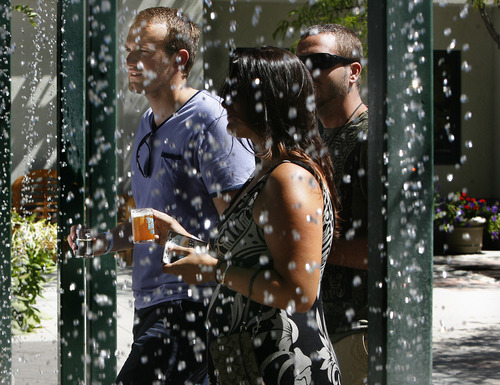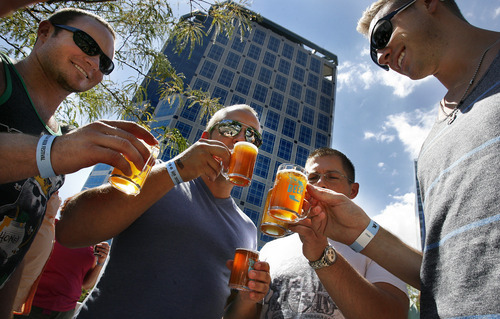This is an archived article that was published on sltrib.com in 2012, and information in the article may be outdated. It is provided only for personal research purposes and may not be reprinted.
More than 4,000 people sampled some 88 different beers offered by 23 breweries in Utah and the region on Sunday at the Gallivan Plaza in Salt Lake City — a municipality that itself boasts six breweries.
"When I'm traveling out of state, people are surprised when I tell them that Utah has some great breweries," said Trevor Wilson of Salt Lake City as he sampled some suds. "But we do. We really do."
Laurie Hallas of Sandy said she was taken aback when she saw the number of people at the festival and the wide variety of beer selections.
"There's also a great diversity here — in ages, ethnicity and different groups," she said. "It's great."
Jacklyn Briggs, manager of the third annual City Weekly Beer Festival, said more Utahns are becoming interested in the beer culture in a state not always known for its breweries.
It was in 1986 when Greg Schirf opened Utah's first brewery in nearly 20 years in Park City, introducing its inaugural Wasatch Premium Ale.
Prohibition, which outlawed U.S. beer sales from 1920 to 1933, had killed off Utah breweries, such as the four-story Salt Lake Brewing Company in Emigration Canyon, once considered the largest as far west as California.
Still, Utah became the 36th and deciding state to ratify the 21st amendment to the U.S. Constitution, allowing liquor to again flow legally across the country. Utah lawmakers, however, quickly passed the Liquor Control Act, forming a state liquor monopoly that continues to this day.
The festival came up against Utah liquor controls soon after its inaugural event in 2010. The following year state lawmakers outlawed a single price for unlimited samples at beer festivals, instead installing a token system that keeps track of drinks.
That same year, lawmakers also put restrictions over how beer is served in new eateries, requiring that servers pop open bottles of beer out of diners' view. Beer taps also must be inoperable or placed in a back room out of public view.
The new controls aren't hurting sales at Red Rock Brewing Co., said head brewer Kevin Templin.
Red Rock expects to sell 4,000 to 5,000 barrels of beer this year, up from 2,000 barrels last year. Although the majority of its sales are within the Beehive state, Red Rock also offers its Utah brews in Idaho and Georgia, and soon in Colorado and Nevada.
Twitter@DawnHouseTrib —
Utah Beer Festival
Participating Beehive state brewers:
Squatter's • Salt Lake City
Wasatch • Park City
Bohemian • Midvale
Uinta • Salt Lake City
Roosters 25th Street • Ogden
Ruby River • Murray
Shades of Pale • Park City
Epic • Salt Lake City
Hoppers • Midvale
Desert Edge • Salt Lake City
Red Rock • Salt Lake City
Moab • Moab
Wing Nutz • Salt Lake City Beer in the Beehive State:
1856 • Orrin Porter Rockwell, bodyguard to Mormon colonizer Brigham Young, operated Hot Springs Hotel and Brewery near Point of the Mountain.
1864 • German immigrant Henry Wagener built Utah's first major commercial brewery at the mouth of Emigration Canyon in Salt Lake City.
1874 • German-born Jacob Moritz redesigned a small brewery (near Wagener's) which became the largest as far west as California.
1917 • Utah embraced statewide prohibition.
1920 • 18th Amendment ratified outlawing manufacturing, selling and transporting alcohol nationwide.
1934 » Beer again legal to buy in Utah, but vacuum left by prohibition was filled by out-of-state macro-breweries.
1935 » Utah Legislature passed Liquor Control Act, putting the government permanently in charge of selling anything stronger than 3.2 beer.
1986 • Greg Schirf opened Utah's first brewery in nearly 20 years in Park City; inaugural beer was Wasatch Premium Ale.
2011 • Utah Legislature required new eateries to hide servers pouring beer from bottles, cans and taps.





